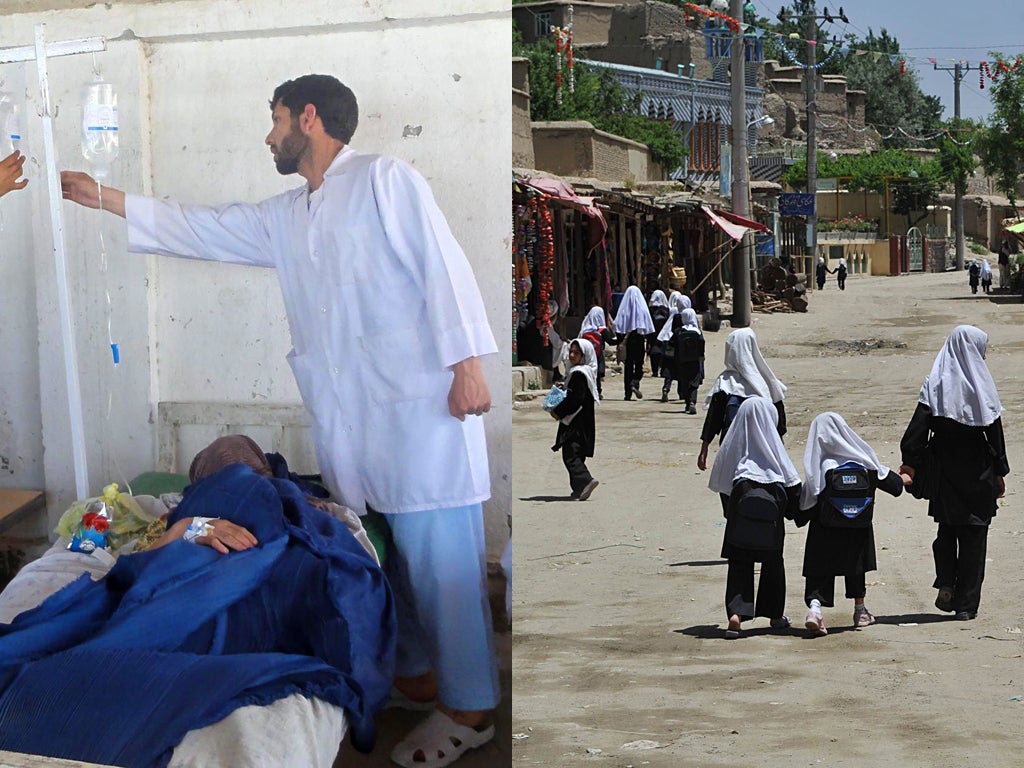Fear in the classrooms: is the Taliban poisoning Afghanistan's schoolgirls?
Hundreds in hospital – but are terror attacks on schools to blame, or mass hysteria?

Hundreds of Afghan schoolchildren have been admitted to hospital in the past six weeks after falling victim to what appears to be six separate major poison attacks. Three alleged attacks have occurred in northern Takhar province in the past week alone, affecting more than 300 girls.
Some government and police officials have blamed the poison attacks on the Taliban, whose hostility to girls' education during its hardline rule in the 1990s is well documented. Others have blamed the "enemies of Afghanistan" and hinted at the involvement of Pakistan and Iran.
Tests by the International Security Assistance Force (Isaf) and government, however, have not found any toxic substances. One international expert has said the scares have all the hallmarks of mass hysteria.
In the most recent attack, on Tuesday, 170 girls in Takhar's provincial capital, Taloqan, were taken to hospital after falling ill and losing consciousness. Pupils blamed poisonous gas, claiming to have sniffed a noxious odour on entering their classroom at Ahan Dara Girls' High School. Students at Bibi Haji school also blamed toxic gas for poisoning them in two separate attacks on 23 May and 27 May. Girls at another school in Takhar became ill in April and said the drinking water in their well had been deliberately contaminated.
More than 200 boys at a school in eastern Khost province also fell sick in mid-May as well as 100 girls in northern Balkh province said on 9 May. Their school said its well had been poisoned.
Symptoms have included vomiting, nausea and fainting. In all cases, most pupils who were admitted to hospital were released on the same day and no long-term damage was done.
On each occasion, the local authorities sent blood samples from poisoned students for tests and launched an investigation into the circumstances.
Gul Agha Ahmadi, a media adviser at the Ministry of Education in Kabul, told The Independent that officials were awaiting test results from the most recent poison scares but that results from tests done after the incidents in April and early May had failed to show the presence of harmful substances.
Isaf tests into the Khost incident also showed no harmful substances present. The "initial laboratory test of multiple air, water and material samples were negative for any organic compounds such as poisons or other toxic material," an Isaf spokesman said. "Further tests continue, but at this point it is unlikely that any foreign substance caused the reported symptoms."
Mr Ahmadi said mass hysteria could not be ruled out, because Afghan people live in constant fear of insurgent attacks and could easily imagine terrorists poisoning their drinking water.
Robert Bartholomew, a prominent sociologist, also told the AFP news agency that the poisoning scare had "the tell-tale signs" of mass hysteria.
He said, "the preponderance of schoolgirls; the absence of a toxic agent; transient, benign symptoms; rapid onset and recovery; plausible rumours; the presence of a strange odour; and anxiety generated from a wartime backdrop" all pointed to mass hysteria. As a result of having been at war for more than 30 years, half the Afghan population suffers from psychological problems, according to Bashir Ahmad Sarwari, the head of the government's mental health department.
Not everyone is buying the mass hysteria theory. Lotfullah Mashal, a National Directorate of Intelligence spokesman, said closing schools was part of the Taliban's spring offensive.
But the Islamic group vehemently denied involvement. "If found in any part of the country, those doing such activities would be given punishment according to sharia," it said.
As many as 550 schools affecting 300,000 pupils have been shut down in 11 provinces where the Taliban has a robust presence, the Ministry of Education said. The insurgents threaten schools partly because they do not support the government curriculum.
Join our commenting forum
Join thought-provoking conversations, follow other Independent readers and see their replies
Comments